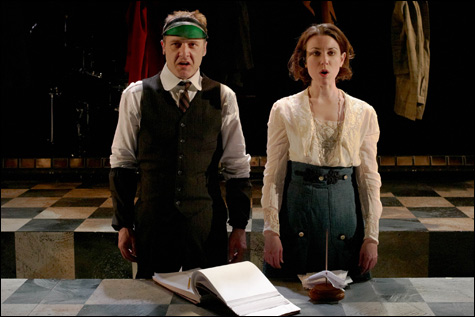
NOTHING DOING? Brendan McNab and Liz Hayes crunch the numbers. |
A bleak expressionist fable centered on a murderous bookkeeper symbolically named Zero. Even when you throw in sexual repression, religious zealotry, a trip to Heaven, and enough dissonance to sate Stephen Sondheim, that doesn’t sound like the stuff of song and dance. But co-librettist Jason Loewith felt sure that Elmer Rice’s 1923 landmark The Adding Machine could be reconfigured as Adding Machine: A Musical. He convinced composer and co-lyricist Joshua Schmidt. And the two of them convinced Chicago and New York, in which towns it picked up a passel of trophies. Hey, count me in.
As staged with musical ferocity and grim stylishness by SpeakEasy Stage Company (at the BCA’s Calderwood Pavilion through April 10), Adding Machine: A Musical is surprisingly faithful to Rice’s 87-year-old indictment of mechanized modern life. Like the original, the show tells the nihilistic tale of Mr. Zero, who spends his days adding figures in a nameless office and snapping at the secretary whose tenderness he’s too timid to return. At night, he goes home to a shrewish wife who treats him like the loser he is. When Zero’s 25 years of coghood in the corporate machine are met not with a promotion but with replacement by the contraption of the title, the pink-slipped bean counter goes temporarily berserk and stabs the boss. Courtroom drama, prison drama, and a constricted gambol in the Elysian Fields ensue before Zero is introduced to the “biggest machine of all,” a cosmic gizmo that retreads souls and sends them back for another turn on the treadmill of life.
Schmidt ingeniously echoes Rice’s automatism in music that is itself mathematic and mechanical, filled with counterpoint, agitated staccato, and motifs that repeat like Zero’s numbing daily routine or the numbers in his head. This is discordant, sophisticated stuff accompanied only by piano, percussion, and synthesizer (ably conducted by music director Steven Bergman). And it takes accomplished singers to render it in its jangling, hypnotic complexity. Here you know from the rendering by a disembodied chorus of “Prologue: In Numbers” that you’re in good hands — or larynxes.
As Mr. Zero, Brendan McNab is as vocally formidable as his surly-milquetoast character is unworthy. Amelia Broome takes Mrs. Zero’s harsh screed of an opening number and injects some sad beauty into it before turning on a dime to stridency. At the other end of the gamut is Liz Hayes, a delightful surprise as Zero’s romantic road not taken, the liltingly dubbed Daisy Dorothea Devore. Hayes applies an unornamented soprano to the score’s few instances of melodic relief and a Tyne Daly–esque brusqueness to her wistful character, who follows our up-tight antihero into the Beyond.
The strangest role (played in 1923 by Edward G. Robinson) is that of Shrdlu, a religiously deranged matricide whom Zero meets first on death row and then in the afterlife, where Shrdlu is driven mad by encountering not hellfire but license. John Bambery imbues this nutcase with a discomforting charisma and displays his musical chops on the Church-inspired “The Gospel According to Shrdlu.” As Zero’s dismissive Boss, Sean McGuirk is serpentine capitalism personified. And as for a chorus made up of Leigh Barrett, David Krinitt, Cheryl McMahon, and Bob De Vivo — that’s not a chorus, it’s a whole spare cast.